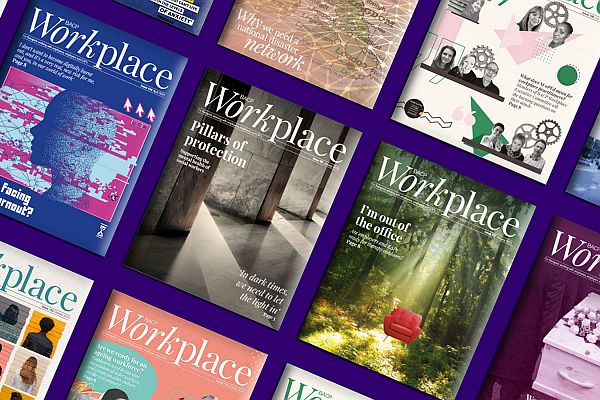A good friend of mine often says that she lives with death on her shoulder because it reminds her how to live each day: fully, consciously and as if it might just be her last. Admittedly, her work as a funeral director gives her a particular insight into the precarity of life, but as death is the only certainty facing us all, it’s striking that 54% of adults in the UK don’t have a will.1
Similarly, too many employers are ill prepared for what happens when an employee receives a terminal diagnosis, and with Dying Matters Awareness week falling on 8 to 14 May, it felt timely to put a spotlight on how we can best support both our clients and the organisations we work with.
Death and dying at work, written by Faith Holloway from Hospice UK, who I met at the Health and Wellbeing at Work Conference at the NEC in March, is our lead article. Faith spoke about the Compassionate Employers programme, run by Hospice UK, which offers training and support to organisations to help them be kinder and better equipped to talk to an employee who has just received the news that no one wants to receive.
The key message is for employers to get prepared, because, if it hasn’t happened yet – it probably will. Fewer than 5% of organisations have a terminal diagnosis illness policy in place, so when an employee is still reeling from a diagnosis, it’s shocking how often employers respond with a lack of compassion, confusing messages or even decide it’s a good move to put the employee on a performance review for having cancer.
It's likely that therapists working with clients who’ve had a terminal diagnosis or who have a loved one who has, will have heard of both good and poor practice on the part of the employer. While highlighting both the legal and financial implications for employers, Faith makes the moral and ethical case too. Compassion and competence go a long way when working with an employee facing an early death, and the way in which an employer responds, kindly or otherwise, will be remembered for years to come and becomes part of the organisation’s memory and legacy.
As society expects more of its employers when it comes to our emotional and psychological health, Jane Moffett opens up the taboo topic of miscarriage, in Conversations. Are employers doing enough to support female employees who experience miscarriage? Apparently not, according to some recent research from the CIPD, which suggests that while good practice exists, there is plenty more that could be done in this area. It’s an important read for therapists and employers alike.
Continuing with her series, Talking menopause, Helen Kewell turns her attention to men in midlife, and offers some fascinating insights for therapists navigating this terrain with their male clients. While cautioning our profession against the seduction of colluding with stereotypes about the midlife crisis, Helen highlights how the midlife transition can be complex for men within the workplace.
Complexity in our relationships at work is explored further in Race matters, as regular writer Letesia Gibson asks: how fragile are our (male) leaders? Reflecting on what she is witnessing, Letesia argues that we are increasingly seeing a fragility that sits at the intersection of whiteness and masculinity, which has serious consequences for how organisations approach the work of cultural change. The damning Final Report, by Baroness Casey, into the standards of behaviour at the Metropolitan Police, which was published in March, and a high-profile review of the London Fire Brigade, point to how serious those consequences can be.2,3
I was interested to interview Bernie Wright in My workplace. Bernie speaks with honesty about her own experience of being neurodivergent (ND) and how she supports other ND people in her work as both a therapist and trainer. It’s amazing how much we continue to learn about how the pandemic and lockdown have impacted on our society in a myriad of ways. Bernie explains how, as a result of lockdown and the change to working practices, ND employees have become far more empowered and vocal members of the workforce, unwilling to stay silent and more able to ask for what they need.
Encouraging agency when it comes to how we manage the ageing process is a key message in Ageing Upwards, a new book written by Berit Lewis. When most books written about ageing are in fact about how to avoid ageing, by staying, looking and feeling young, I found Berit’s book a thought-provoking read about how we might embrace later life.
As I draw to a close, I’m reflecting that one other certainty in life is change – it’s everywhere, especially when it comes to work. So, with that in mind I’d like to say a heartfelt thank you and farewell to Jacqui Gray, Managing Journals Editor, who is leaving BACP. We have worked together for 10 years, which equates to 42 issues of BACP Workplace and an immense amount of hard work behind the scenes. Thank you, Jacqui – I will miss you more than you possibly imagine.
References
1 https://www.which.co.uk/news/article/half-of-adults-dont-have-wills-but-what-happens-to-your-children-when-you-die-a742J6M3Myec
2 https://www.met.police.uk/SysSiteAssets/media/downloads/met/about-us/baroness-casey-review/update-march-2023/baroness-casey-review-march-2023.pdf
3 Review of the London Fire Brigade: Findings and reaction - House of Lords Library (parliament.uk)
Read more...

BACP Workplace
Subscribe for free access to the online journal

BACP Workplace division
BACP Workplace promotes and supports the professional practice of counselling in the workplace, and practitioners who have clients experiencing workplace concerns.

Blogs and vlogs 2023
News and views from members, staff and clients
